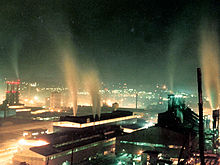Oscar Sinigaglia
Despite inheriting a company plagued by large amounts of debt, liabilities, and interests, his managerial skills allowed him to navigate these financial difficulties.
After graduating from university in 1900 with a degree in civil engineering, he directed the Ferrotaie society, and also founded the trading company Sinigaglia-Di Porto.
In 1918, at the end of the First World War he supported the cause of Italian Fiume, becoming a Nationalist leader and one of the first members of the Fasci Italiani di Combattimento.
In 1919, he was next to his future father-in-law Teodoro Mayer [it] in provision of capital necessary to refound "Il Piccolo" which was destroyed in a fire set by a pro-Austrian in the evening of 23 May 1915.
Sinigaglia also worked with Ernesto Manuelli and Agostino Rocca, persons with great influence on the subsequent developments of the Italian steel industry.
The reasons for his resignation, remain unclear, perhaps due to 'escalation of conflict with the leadership of Ilva, which made leverage racial motivation for the removal of a president by the "revolutionary" ideas.
Possibly because of a vow made during WWII, he ceded to the Vatican Vianini Lavori [it] a Centrifugal casting (industrial) company he owned.
